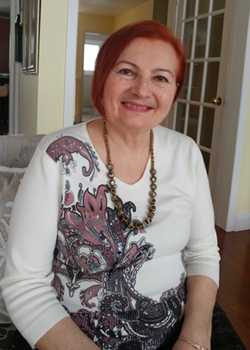‘A chance to live again’: one patient’s journey to transplant

By Ana Gajic

Zdenka Volek
As a high school student in Bosnia, Zdenka Volek started to experience minor kidney function issues. She would experience symptoms for a few years at a time, and then they would pass. When Volek came to Canada in the early 1990s to escape war in her homeland, she found a nephrologist to manage her care. In 2006, her kidney function started to deteriorate, and in 2014 Volek went on dialysis.
“I always tried not to think of dialysis – I tried not to think it would happen,” Volek said. “When it finally did, I took it very hard. I was in great shock.”
With the support of her family – her husband and her two sons – Volek adapted to the overnight dialysis schedule.
“I realized this was just one phase of my journey,” she said.
The List Exchange Program
Volek’s particular blood type and antibody composition made it difficult for her to find a match for transplant, but her husband was willing to donate a kidney to help her.
Volek’s family and the care team at St. Michael’s Hospital looked for options. The couple decided to participate in the List Exchange Program, through which Volek’s husband would donate one of his kidneys to a recipient at the top of the waiting list for his matching blood group. In turn, Volek would move to the top of the transplant list for her blood group as she had helped supply a kidney to the system.
Within a few months, a kidney from a deceased donor became available for Volek.
When she got the call that a donor kidney was available, Volek was in the middle of preparing a party for her son who had just gotten married.
“I cancelled everything and came straight to the hospital,” she said with a smile. “I thought I can have the party after.”
‘A chance to live again’
Volek’s new kidney started to work right away, and she experienced very little pain. Her husband stayed with her in the hospital room every night during her recovery.
“We were very happy,” she said.
After the transplant Volek was able to swim again, go skiing and do yoga. Her diet wasn’t as restricted and she didn’t have to worry about dialysis equipment when they traveled.
“I am grateful that transplant exists and that I got to meet the doctors and people at St. Michael’s. I really have had a great experience.”
As promised, Volek had a party for the newlyweds after she recovered. Now she also has a newborn granddaughter.
“I am now living a happy life. I think this is something amazing – a great thing. It gives you a chance to live again.”
Zdenka Volek is the sixth in a series of patients we’re profiling to celebrate our Kidney Transplant Program’s 50th anniversary. It’s called a called #MyTXanniversary, and we want to encourage more people to register as organ donors and highlight its patients and staff by sharing stories of their own transplant anniversaries.
- Sign up to be a donor, or check your registration status online today at our donor drive.
About St. Michael’s Hospital
St. Michael’s Hospital provides compassionate care to all who enter its doors. The hospital also provides outstanding medical education to future health care professionals in more than 27 academic disciplines. Critical care and trauma, heart disease, neurosurgery, diabetes, cancer care, care of the homeless and global health are among the Hospital’s recognized areas of expertise. Through the Keenan Research Centre and the Li Ka Shing International Healthcare Education Centre, which make up the Li Ka Shing Knowledge Institute, research and education at St. Michael’s Hospital are recognized and make an impact around the world. Founded in 1892, the hospital is fully affiliated with the University of Toronto.
About Unity Health Toronto
Unity Health Toronto, comprised of Providence Healthcare, St. Joseph’s Health Centre and St. Michael’s Hospital, works to advance the health of everyone in our urban communities and beyond. Our health network serves patients, residents and clients across the full spectrum of care, spanning primary care, secondary community care, tertiary and quaternary care services to post-acute through rehabilitation, palliative care and long-term care, while investing in world-class research and education. For more information, visit www.unityhealth.to.
